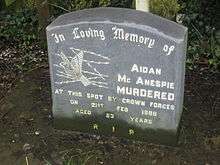Aidan McAnespie
Aidan McAnespie (1965 – 21 February 1988) was an Irish nationalist activist and Sinn Féin election worker who was shot dead by a British soldier at the Aughnacloy, County Tyrone border checkpoint in Northern Ireland during the Troubles.
Death
McAnespie, a member of Aghaloo O'Neills Gaelic football club, was travelling to a match when he was killed by a gunshot wound to the back. He had just walked past a British Army checkpoint.[1][2] The British Army said that McAnespie had been hit when the weapon had discharged accidentally as a soldier was moving the gun with wet hands. Forensic evidence suggested that the fatal shot was one of three that had ricocheted off the road two metres behind McAnespie.[3][4]
Charges were initially brought against Grenadier Guard David Jonathan Holden for manslaughter but were dropped prior to prosecution.[2] He was fined for negligent discharge of the weapon and in 1990 was given a medical discharge.[5]
McAnespie was an election worker for Sinn Féin, but both the Provisional Irish Republican Army and his priest said that he was not involved in paramilitary activity.[6] He had previously said that he had been threatened by the security forces,[7] and, according to his sister, soldiers had threatened to kill him on several occasions.[8]
McAnespie's family allege a cover-up by the British government and question the likelihood of accidental discharge killing their son from a distance of 300 metres.[9] His father, in an article in the Observer Magazine, claimed that a soldier had stopped him some fifteen months before the shooting and told him, "I've a bullet here in the gun for your son Aidan". [5]

Investigations
The day after the killing, the Irish Government appointed Garda Deputy Commissioner Eugene Crowley to investigate the incident.[7] The results of the investigation were received by the Minister for Justice, Equality and Law Reform Gerry Collins on 8 April 1988, but have never been published.[10][11] A Royal Ulster Constabulary investigation took place which concluded that the killing was accidental.[12]
In June 2008, the Police Service of Northern Ireland (PSNI) Historical Enquiries Team published its findings on the case. The report called the soldier's explanation for the killing the "least likely version" of what happened. The Ministry of Defence said it had co-operated with the inquiry and understood that this did not uncover any new evidence that would warrant further investigation.[4]
In October 2008, the PSNI investigation concluded that Jonathan Holden's gun required 9 lbs of pressure to pull the trigger, and that the soldier's account of the events was highly unlikely. It described the chances of this occurring, combined with hitting McAnespie by accident as, "so remote as to be virtually disregarded".[13]
The Secretary of State for Northern Ireland, Shaun Woodward expressed "deep regret" at the incident in a statement made in July 2009, which was welcomed by McAnespie's family.[3]
In January 2016, it was announced that the Public Prosecution Service for Northern Ireland would review the decision not to proceed with manslaughter charges against the soldier.[14]
Tributes
The largest Gaelic football club in Boston, Massachusetts is named in McAnespie's memory.[15]
Aghaloo O'Neills Gaelic Athletic Association club hosted a weekend of Gaelic football and cultural events in 2013 to mark the 25th anniversary of his death.[16]
References
- ↑ Kelly, Ned (30 April 1998). "Groundswell against GAA rule change". An Phoblacht (IRLNet/Sinn Féin). Retrieved 29 September 2007.
- 1 2 "British soldier accused of killing back on duty". Philadelphia Inquirer. 26 June 1998.
- 1 2 "'Regret' over NI checkpoint death". RTÉ News. 27 July 2009. Retrieved 23 October 2015.
- 1 2 "Checkpoint death report welcomed". BBC News NI. 24 June 2008. Retrieved 24 June 2008.
- 1 2 McKittrick, David (2007). Lost Lives: The Stories of the Men, Women and Children Who Died Through the Northern Ireland Troubles. Mainstream Publishing. ISBN 978-1-84018-504-1.
- ↑ Newspaper story about McAnespie's death, news.google.com; accessed 23 October 2015.
- 1 2 Bell, Robert; Robert Johnstone; Robin Wilson (1991). Troubled Times: Fortnight Magazine and the Troubles in Northern Ireland 1970-1991. Belfast: The Blackstaff Press. p. 210. ISBN 0-85640-462-4.
- ↑ Submission to The Forum for Peace and Reconciliation, Dublin Castle. Dublin: The Forum for Peace and Reconciliation. April 1995. Retrieved 23 October 2015.
- ↑ Murray, Raymond (1998). State Violence: Northern Ireland 1969-1997. Cork: Mercier Press. ISBN 1-85635-235-8. Retrieved 23 October 2015.
- ↑ The Houses of the Oireachtas (19 April 1988). "Ceisteanna—Questions. Oral Answers-Death of Aidan McAnespie". Dáil Éireann Parliamentary Debates 379. Retrieved 29 September 2007.
- ↑ MacDonncha, Michael (12 August 1999). "Dublin/Monaghan and Ludlow inquiries must be public: Report of the Victims Commission". An Phoblacht (IRLNet/Sinn Féin). Retrieved 29 September 2007.
- ↑ House of Commons (20 July 1989). "Oral Answers to Questions: Northern Ireland". Hansard (the Official Report) 502. Retrieved 29 September 2007.
- ↑ PSNI investigation into McAnespie killing, breakingnews.ie; accessed 23 October 2015.
- ↑ Henry McDonald (21 January 2016). "Decision not to prosecute soldier over Northern Ireland killing to be reviewed". The Guardian.
- ↑ "Aidan McAnespie G.F.C. Boston". Archived from the original on 28 September 2007. Retrieved 29 September 2007.
- ↑ "Brother recalls controversial killing of Aidan McAnespie 25 years on", Ulster Herald, 21 February 2013.